“Israel” has learned a lot from the second intifada, which erupted in September 2000, says a retired colonel, who back then served as deputy commander of the combat intelligence corps. The primary lesson was to prevent a repeat of such bloody events, something that the “Israeli” entity has managed to master.
It was a decision that sparked mass protests against the entity, triggering a fire.
Twenty years ago, on 28 September, then head of the “Israeli” entity’s opposition Ariel Sharon paid a visit to al-Haram Sharif [Temple Mount] in al-Quds [Jerusalem].
The official reason for the visit was to inspect the construction work that has been done in the area, but Palestinians regarded it as an attack on their holiest of holies and didn’t want it to go unnoticed.
A day after the visit, the Palestinian Authority [PA] announced three days of mourning and the fire of the Second Intifada, or the Palestinian popular uprising, lit by Sharon, started spreading, just 13 years after the first intifada.
Protests in Jerusalem inspired more protests by Palestinians across the West Bank and even Arabs within Israel. In the eight days following the visit, 13 Palestinians were killed amid violent clashes with Israeli security forces. Hundreds on both sides were wounded.
No Surprise
But the events didn’t catch the entity’s military by surprise.
Miri Eisin, now a retired colonel, who back then served as deputy commander of combat intelligence corps, says the army has been preparing for a possible Palestinian uprising from late 1990s, collecting information and following the Palestinian leaderships’ movement.
For her, as well as the security apparatus she represented, the question was not if the riots would start but rather when and what would ignite them.
Apparently, Sharon’s visit provided that spark, but Palestinian leaders have admitted that that was only an excuse and that the violent uprising would have happened regardless, with or without his move.
The entity’s response was quick and harsh, and Eisin says that magnitude probably “ignited an additional cycle [of violence]” that could have been avoided otherwise.
“In the first few months we were harsh against different types of events that started the intifada. They were instigating and we were responding”.
Programed to Respond with Force
During that time, the “Israeli” Occupation Forces [IOF] fired back at young people that threw stones at “Israeli” soldiers and responded violently in clashes with the Palestinian security forces.
It also rounded up and jailed hundreds of those who planned attacks or simply those who obstructed regular life, filling up “Israeli” prisons with Palestinian inmates.
Back then, Eisin admits, the IOF was programed to treat such events as a security challenge, and cared little about the media factor and the public diplomacy that has been used by the Palestinians to tilt international opinion in their favor.
As a result, “‘Israel’ was winning the battle but losing the war,” because while the entity was effective in combating Palestinian operations, it was condemned far and wide in the international arena.
The mass media gave the Palestinian riots a central stage in their coverage, whereas NGOs were scrutinizing the entity’s conduct and published reports on its human rights violations.
During the years of fighting, the “Israeli” entity lost more than 1,100 people. Over 8,000 were injured in Palestinian operations.













No comments:
Post a Comment